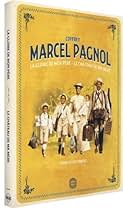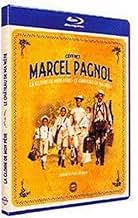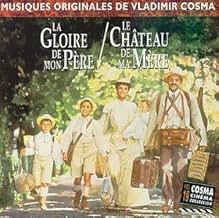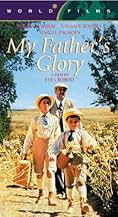IMDb RATING
7.6/10
7.3K
YOUR RATING
At the end of the nineteenth century, little Marcel lives with his parents in the Provence countryside. During his holiday, Marcel meets Lili, a local boy who knows all the secrets of the hi... Read allAt the end of the nineteenth century, little Marcel lives with his parents in the Provence countryside. During his holiday, Marcel meets Lili, a local boy who knows all the secrets of the hills, and the two become fast friends.At the end of the nineteenth century, little Marcel lives with his parents in the Provence countryside. During his holiday, Marcel meets Lili, a local boy who knows all the secrets of the hills, and the two become fast friends.
- Awards
- 2 wins & 5 nominations total
Featured reviews
This is one film I would recommend to everybody. I remember when I saw that film in the theatre in france in 1990, I fell in love with it,the acting is great ,the locations are beautiful,the story is very touching,this film is a winner for sure.I probably saw this film in is follow up a thousand time and after each viewing it's just getting better. I would also say that the music of Vladimir Costa is fantastique it fits the scenery like a pair of gloves. The best french film ever in my opinion.
This is a very detailed description of the life of a French family. It is a sweet story gently told. It is about growing up, expanding horizons, the influence of friends and family members, enjoying happy times together, and reacting to life's inevitable problems. In this film we recognise moments in our own lives. The film has a universal theme.
In a documentary style the older son Marcel relates how his father Joseph a schoolteacher takes up positions in various parts of France and how before school-going age he sits at the back of the class and quickly learns how to read the text on the blackboard. Family life seems to revolve around teaching and the classroom until Aunt Rose meets Jules on a park seat and eventually marries him. After Jules joins the family circle father learns that there are more things in life than the educational system.
When the family rents a villa in a wild part of Provence, Jules instructs father on the use of the gun and they go on hunting sprees together. On one of these expeditions the son gets lost and meets up with a local boy about his own age. From him he learns about local birds, the eagles, the owls and scary stories about how these wild birds go for the eyes of their prey. This escape into the wild is a charming part of the family's life story and the final parting between the two boys when the family finally leaves is indeed moving.
The story is sprinkled with amusing incidents. For most boys the birth of a child is nothing short of a miracle. They conjecture that the navel is a kind of button which can be unbuttoned to let the baby out. And when father learns to shoot, Jules attaches a target to the outside toilet door. Father is delighted when he gets a bull's eye and Jules does well too. Not so the maid who happens to be inside the toilet at the time. Fortunately she emerges shaken but unharmed.
The film covers so much of French life. It is amazing how much is packed in. The story unfolds at an easy pace with beautiful music that never intrudes and scenery that astounds. I can recommend this little masterpiece about how wonderful family life can be.
In a documentary style the older son Marcel relates how his father Joseph a schoolteacher takes up positions in various parts of France and how before school-going age he sits at the back of the class and quickly learns how to read the text on the blackboard. Family life seems to revolve around teaching and the classroom until Aunt Rose meets Jules on a park seat and eventually marries him. After Jules joins the family circle father learns that there are more things in life than the educational system.
When the family rents a villa in a wild part of Provence, Jules instructs father on the use of the gun and they go on hunting sprees together. On one of these expeditions the son gets lost and meets up with a local boy about his own age. From him he learns about local birds, the eagles, the owls and scary stories about how these wild birds go for the eyes of their prey. This escape into the wild is a charming part of the family's life story and the final parting between the two boys when the family finally leaves is indeed moving.
The story is sprinkled with amusing incidents. For most boys the birth of a child is nothing short of a miracle. They conjecture that the navel is a kind of button which can be unbuttoned to let the baby out. And when father learns to shoot, Jules attaches a target to the outside toilet door. Father is delighted when he gets a bull's eye and Jules does well too. Not so the maid who happens to be inside the toilet at the time. Fortunately she emerges shaken but unharmed.
The film covers so much of French life. It is amazing how much is packed in. The story unfolds at an easy pace with beautiful music that never intrudes and scenery that astounds. I can recommend this little masterpiece about how wonderful family life can be.
This, like "Jean de Florette" and "Manon Of The Spring" is the first of two French films that go together. The second part of this story is the film, "My Mother's Castle." See them both, but if you can only see one, my recommendation is "My Mother's Castle."
As in many French films, this offers very little action and not much that is noteworthy but is filled with interesting characters and excellent storytelling. The French still offer that great storytelling, something that has slowly faded among filmmakers in other countries.
This story is based on the memoirs of Marcel Pagnol, a very Liberal educator and atheist. His views are probably the main reason critics all loved this movie. They could identify.
Despite the father's shortcomings, there is a nice appeal here as all the characters are interesting to varying degrees. I love the way they all express themselves, certainly different than we do here in North America. As with most of these French stories, there is very little profanity, too.
As in many French films, this offers very little action and not much that is noteworthy but is filled with interesting characters and excellent storytelling. The French still offer that great storytelling, something that has slowly faded among filmmakers in other countries.
This story is based on the memoirs of Marcel Pagnol, a very Liberal educator and atheist. His views are probably the main reason critics all loved this movie. They could identify.
Despite the father's shortcomings, there is a nice appeal here as all the characters are interesting to varying degrees. I love the way they all express themselves, certainly different than we do here in North America. As with most of these French stories, there is very little profanity, too.
"My Father's Glory," and its sequel "My Mother's Castle," tell the story of a young boy's "wonder years" growing up in a family with an adored father, a lovely but frail mother, and assorted eccentric relatives and friends. These are incredibly charming films that feature none of the violent action and highly charged emotions that we've come to expect in popular films today. Instead, they celebrate the simple joys of life in a warm and loving family. When minor but unexpected events occasionally disrupt the day-to-day flow of events, they can seem like terrible disasters. On the other hand, a simple visit to the country can seem like a tremendous adventure. It's not necessary to have seen "My Father's Glory" to enjoy "My Mother's Castle." In fact, I happened to see them out of order and I loved them just the same. But if I had my preference, I'd watch them in order. The final scene of "My Mother's Castle" is emotionally powerful and satisfying; for me it confirmed that every minute I'd invested in these films was worthwhile. I wanted to get up there on the screen and help. In French with English subtitles.
This film takes us back to 1900 and depicts a family with children who are refreshingly innocent, yet believable and amusing every step of the way. The story takes us on a journey with Marcel, the narrator, who thinks his father is superhuman and refuses to see him as anything less. To view life through Marcel's eyes is enchanting; he is so easily spellbound by his surroundings, so in love with the hills of his native Provence.
The cinematography is absolutely breath-taking, giving one the feeling of watching poetry in motion. The scene at the park on a Sunday afternoon is like watching a painting come to life. But cinematography is only a feather on the cap of this first rate production. The direction is superb, and the performances very touching.
I recommend this film highly. It is good as a visual sedative, and the only side effect it might have is a possible urge to quit your job, pack it up, and move to the French countryside writer Marcel Pagnol so loved.
The cinematography is absolutely breath-taking, giving one the feeling of watching poetry in motion. The scene at the park on a Sunday afternoon is like watching a painting come to life. But cinematography is only a feather on the cap of this first rate production. The direction is superb, and the performances very touching.
I recommend this film highly. It is good as a visual sedative, and the only side effect it might have is a possible urge to quit your job, pack it up, and move to the French countryside writer Marcel Pagnol so loved.
Did you know
- Trivia'La Gloire de mon père', published in France in 1957, is the first volume of four autobiographical novels by Marcel Pagnol. The second volume, 'Le château de ma mere', was published in 1958. In the novels, Marcel's meeting Lili takes place in volume two, as does Marcel's decision to stay at Provence as a hermit. The two novels were translated into English and published by Doubleday (in the U.S) as a single book in 1960 under the title 'The Days Were Too Short', This translation was reprinted by North Point Press as a single book titled 'My Father's Glory / and / My Mother's Castle' in 1986.
- GoofsOn the family's holiday, each time that it is raining the sky is bright and without a cloud (except the scene with the storm).
- Quotes
Augustine: You need your gun to go shopping?
Joseph Pagnol: You never know.
- How long is My Father's Glory?Powered by Alexa
Details
- Release date
- Country of origin
- Languages
- Also known as
- My Father's Glory
- Filming locations
- Signes, Var, France(bird hunting party)
- Production companies
- See more company credits at IMDbPro
Box office
- Gross US & Canada
- $1,730,856
- Gross worldwide
- $1,730,856
- Runtime1 hour 45 minutes
- Color
- Aspect ratio
- 1.85 : 1
Contribute to this page
Suggest an edit or add missing content


![Watch Bande-annonce [OV]](https://m.media-amazon.com/images/M/MV5BNjNlYzQ0NGQtODdlNS00YzRmLTlhYzQtZDdiOTNiZDZlYWYzXkEyXkFqcGdeQXRyYW5zY29kZS13b3JrZmxvdw@@._V1_QL75_UX500_CR0)

























